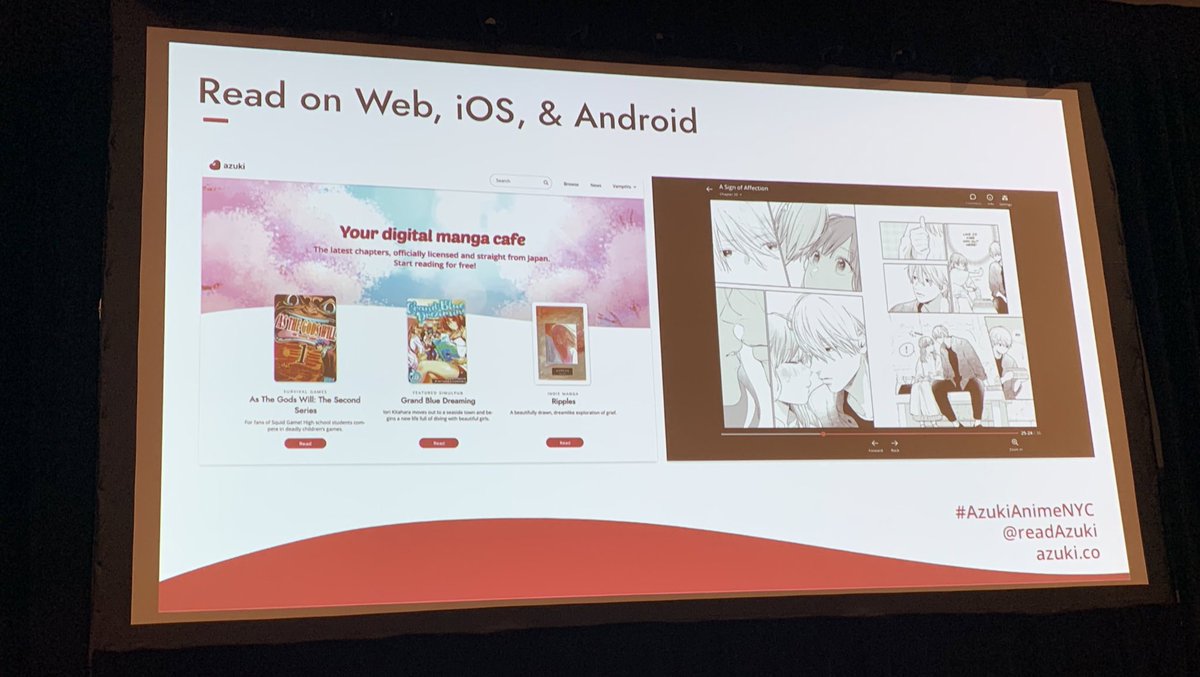
My final ANYC panel of the day - Inside the Manga industry! Feat. @MangaJerk, @ajani22121, @theceoofdeath, @NikDraperIvey, & @KoyukiPanda! 



Introducing the localizers on the panel! Everyone has a unique career and skill set and different stories about how they started working in manga! 





The artists on the panel! Very different styles, but manga had a huge influence on both of their work. Shaman King was Nikolas’s first favorite and Koyuki was big into the big 3! 



Q&A! What advice would they give their younger selves!
Koyuki: Study the business. A dream job is still a business. You gotta understand how to sustain yourself. And don’t give up!
Koyuki: Study the business. A dream job is still a business. You gotta understand how to sustain yourself. And don’t give up!
Nikolas: Don’t bother with art school. Spend the time making dope portfolios, which are what really matter. Go to school for something practical like business so you don’t get duped on a contract.
This response got a big applause and cheer from the crowd!
This response got a big applause and cheer from the crowd!
Mark: it’s very satisfying to be part of the industry in a non-creative role too. There are a lot of cool jobs in the industry besides making the manga itself.
Q&A! How to transition from a PR/Marketing job from one industry to the mag industry? Mark says to go to companies positioning yourself as an expert. Companies want people with diverse interests in manga who know the series well and know how to sell it well.
Q&A: Working in Japan vs here? Feels like worlds apart, but Ajani was only translating when he was in Japan, not editing. As an editor he surprisingly doesn’t speak Japanese much.
Q&A: What tools do you use to organize your stories? Nik pulls from his environment, thinks of it like a movie and base locations of real places. Characters are also pulled from folks he knows. His Static and Sharon and combos of a bunch of friends and people he knows.
Koyuki writes stuff down in notebooks upon notebooks upon notebooks, sometimes in sketchbooks for designs. Everything analogue, she writes everything down.
Q&A! What manga are you reading now that you’re excited about? Nik’s reading Chainsaw Man, Koyuki is reading Satoshi Kong’s Opus (Kon is like one of her 4 creative gods). Mark and Ajani don’t read manga much outside of work, Ajani is reading panpanya and One Punch Man.
And Julian just reads everything he works on. 😂
Q&A: what do they think the industry needs more of? Mark is happy with manga as it is - 2021 is a big year for manga, manga outsells general fiction at Barnes & Noble. There’s a huge breath of stuff coming out and doing well.
Ajani wants innovation on the business side. Some pubs are stuck in old ways of thinking unwelcoming to new ideas. Want more series on the fringes to be taken a chance on.
Julian wants more acceptance of non-Japanese manga. Shout-out to Radiant!
Q&A: How do you recommend translating a fine art’s degree to a comics career? Julian recommends that if you still need improvement as an artist and can benefit from art school, going can help. But don’t waste your secondary classes on stuff that won’t help you. Dig at SCAD. 😂
Q&A: Is there a place for trans creators in manga? Mark recommends the question asker read Boys Run the Riot, which proves that manga written about trans stories by trans creators can be best sellers.
Q&A: how do you release your comic as a self-published artist? Koyuki says don’t use GoFundMe, that’s not what it’s for. As for asking publishers, show them your portfolio and be your biggest hype man. Tapas and Webtoon are also good places to self-publish.
Produce the best book that you can. If it doesn’t make it with a manga publisher, try a traditional comics publisher too.
Q&A: Do you see more opportunities for American creators to break into manga. Unanimous yes. Manga is outselling American comics, it’s just a waiting game for publishers to shift gears into more manga-style stories. Oni Press and Viz are already publishing manga by US artists.
Q&A: What is it like to bring over a popular manga to the US? It’s a great feeling to find a good comic and be its champion. It may be nerve racking if it’s important to you, but it’s extremely satisfying when a book succeeds.
Mark: A lot of books had to be fought for. Nowadays it’s a little easier, but the feeling of “I Told You So” when a book succeeds is always great! A lot of series he once thought not possible to license have since come out!
• • •
Missing some Tweet in this thread? You can try to
force a refresh


































